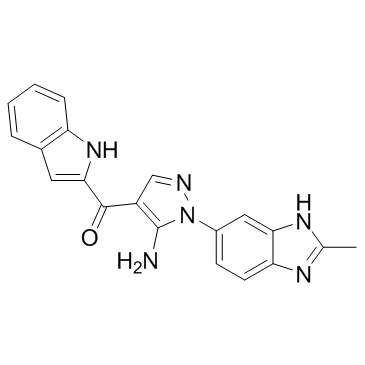1265229-25-1
| Name | [5-amino-1-(2-methyl-1H-benzimidazol-5-yl)-1H-pyrazol-4-yl](1H-indol-2-yl)methanone |
|---|---|
| Synonyms |
[5-amino-1-(2-methyl-1H-benzimidazol-5-yl)-1H-pyrazol-4-yl]-(1H-indol-2-yl)-methanone
[5-amino-1-(2-methyl-1H-benzimidazol-5-yl)1H-pyrazol-4-yl]-(1H-indol-2-yl)-methanone CH5183284 Debio-1347 |
| Description | CH5183284 is an orally available and selective FGFR inhibitor with IC50s of 9.3, 7.6, and 22 nM for FGFR1, FGFR2, FGFR3, and FGFR4, respectively. |
|---|---|
| Related Catalog | |
| Target |
FGFR1:9.3 nM (IC50) FGFR2:7.6 nM (IC50) FGFR3:22 nM (IC50) FGFR4:290 nM (IC50) |
| In Vitro | CH5183284 is well balanced in cellular antiproliferative activity against SNU-16 and stability in human liver microsome. The selectivity of 8 to inhibit FGFR over KDR is suggested to be caused by the difference in the interaction with M535 in FGFR1 and L889 in KDR[1]. The IC50 of CH5183284/Debio 1347 is 29 nM for FGF-dependent proliferation and 780 nM for VEGF-dependent proliferation[2]. |
| In Vivo | CH5183284 treatment shows a dose-dependent tumor regression (tumor growth inhibition (TGI)=106% at 30 mg/kg and 147% at 100 mg/kg) without apparent body weight loss. CH5183284 treatment also shows significant in vivo efficacy in xenograft mice models with FGFR genetic alterations, such as KG1 (leukemia, FGFR1OP-FGFR1 fusion), MFE280 (endometrial cancer, FGFR2 S252W mutation), UM-UC-14 (bladder cancer, FGFR3 S249C mutation), and RT112/84 (bladder cancer, FGFR3-TACC3 fusion)[1]. |
| Cell Assay | The cell lines are added to the wells of 96-well plates containing 0.076−10,000 nM tested compounds (CH5183284) and incubated at 37°C. After 4 days’ incubation, Cell Counting Kit-8 solution is added, and after incubation for several more hours, absorbance at 450 nm is measured. The antiproliferative activity is calculated using the formula (1-T/C) × 100 (%), where T and C represent absorbance at 450 nm of the cells treated with drugs (T) and that of untreated control cells (C)[1]. |
| Animal Admin | Rats: Male Wistar rats (340-390 g) implanted with a telemetry transmitter are used for the assessment of effects on blood pressure (BP). Vehicle (0.5% carmellose sodium, 0.5% polysorbate 20, and 0.9% benzyl alcohol in purified water) or CH5183284/Debio 1347 (10 and 30 mg/kg) are administered by oral gavage once a day for 4 consecutive days. Data for blood pressure are automatically analyzed and continuously recorded at 5-minute intervals[2]. Mice: The in vivo efficacy is evaluated in mice bearing an SNU-16 xenograft. CH5183284 is orally administered once daily for 11 days, and the body weight of mice and the volume of the tumors are measured twice a week[1]. |
| References |
| Molecular Formula | C20H16N6O |
|---|---|
| Molecular Weight | 356.38100 |
| Exact Mass | 356.13900 |
| PSA | 105.38000 |
| LogP | 3.93270 |
| Storage condition | -20℃ |
